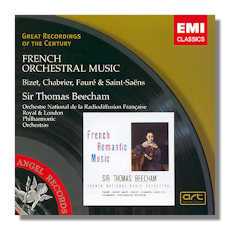
The Internet's Premier Classical Music Source
Related Links
-
Bizet Reviews
Chabrier Reviews
Fauré Reviews
Saint-Saëns Reviews - Latest Reviews
- More Reviews
-
By Composer
-
Collections
DVD & Blu-ray
Books
Concert Reviews
Articles/Interviews
Software
Audio
Search Amazon
Recommended Links
Site News
 CD Review
CD Review
French Orchestral Music

- Georges Bizet:
- Carmen Suite #1 1
- Patrie - Overture 2*
- Roma - Carnaval 2
- Emmanuel Chabrier:
- Gwendoline - Overture 1*
- Joyeuse Marche 2
- España 3*
- Gabriel Fauré: Dolly, Op. 56 1
- Camille Saint-Saëns: Le Rouet d'Omphale, Op. 31 2*
1 Orchestre National de la Radiodiffusion Française/Thomas Beecham
2 Royal Philharmonic Orchestra/Thomas Beecham
3 London Philharmonic Orchestra/Thomas Beecham
EMI 379985-2 Stereo/*Mono 77:35
Summary for the Busy Executive: Une classique.
No matter how much you may enjoy a nice glut on, say, hasenpfeffer in sour cream with dumplings, you may not want to go for a dessert of Baked Alaska, rather a nice lemon ice. For me it's the same after I've been listening to a lot of Wagner and Mahler. Sometimes, you just need to clear the ear's palate, so to speak, and for me, this kind of French music admirably fills the bill.
Sir Thomas Beecham had a special fondness for nineteenth-century French music. His Carmen for EMI with de los Angeles and Gedda remains, I think, the standard recording of that opera. After World War II, Beecham, enraged by the punishing British tax code (Americans have no idea), pulled up his British stakes (although he continued to conduct British orchestras) and moved for good to the south of France. This brought him into closer contact with the great Orchestre National de la Radiodiffusion Française. Most of the recordings here come from that happy collaboration. Some of the tracks, like the 1940 España with the London Philharmonic, are obviously in mono sound. The ONRF recordings are split, with the Gwendoline Overture in mono and the rest in stereo, since the sessions occurred right on the cusp of the stereo era. Beecham's own Royal Philharmonic recordings are all in mono, even at a relatively late date, mainly because British EMI, strongly influenced by producer Walter Legge, committed fully to stereo long after everybody else. Apparently, Legge wanted to wait a few years to make sure the technology wasn't a fad. Lest you think I merely want to bash Legge, I cheerfully admit that though he misjudged stereo, he was dead on about quadraphonics. Thank heavens Beecham's Carmen made it to stereo.
There's no such thing as a bad track on this disc. The brilliance and drama of Beecham shine forth, from the barbaric strut of the toreadors to the happy spring of the Joyeuse Marche. The Carmen Suite, predictably wonderful, is matched by the whirl of Bizet's Roman carnival. Even Patrie – the kind of piece French composers were practically compelled to turn out on occasions like war commemorations and Bastille Day, Beecham reveals as above the common run of such things, with its patriotic huzzahs at the beginning and end and the remembrance of fallen heroes in the middle. I've never been much of a fan of Saint-Saëns' tone poem Le Rouet d'Omphale (Omphale's spinning wheel), especially since I associate it with the opening to the old radio serial "The Shadow," but Beecham's performance stands out for its drama and sense of genuine fun.
Admired and honored by Ravel as an artistic model, Emmanuel Chabrier, like just about every French composer of his generation, including Debussy, succumbed to an infatuation with Wagner's operas. Fortunately, he recovered. Nevertheless, on the evidence of the overture, his opera Gwendoline bears the marks of the fever – the overheated emotion, the Valhalla brass, the vertiginous ascents and plunges of the strings. Beecham, however, turns it into one of the glories of French symphonic music and makes you long to hear the complete opera. For many years, I considered Paray and the Detroit on Mercury the ultimate on record. It remains the best stereo version, I think, but Beecham – mono though it may be – beats it hands down. The playing is stronger, the outlines crisper, and the work has a greater sweep. This and the Carmen amount to my two favorites on the program.
Beecham amounts to more than a grab-bag of epigrams and anecdotes. This release allows you the opportunity of sampling him in some of his most artistically congenial repertoire.
Copyright © 2009, Steve Schwartz





















